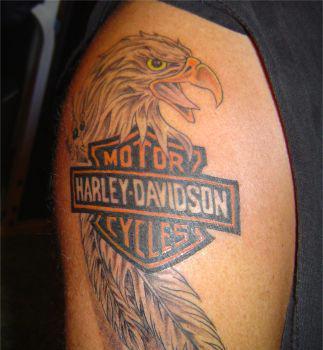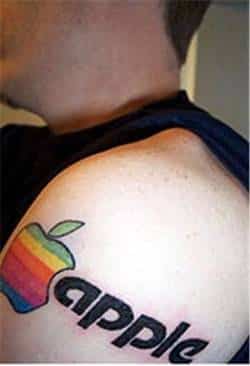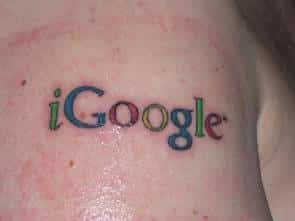Harley-Davidson, Nike, Playboy, Coca-Cola, VW, and Apple logos have been permanently etched into the skins of customers worldwide. Why do they do it? Why do these raving fans, or Brand Lovers, scorch their bodies with a company’s mark? And what can marketers and brand managers learn from them?
Most acts of unabashed brand loyalty are a genuine mystery to marketers: Why do customers anxiously camp outside IKEA grand openings? Why do bikers brand Harley’s flaming eagle onto their arms?

From our research into the nature of cult brands and brand lovers, we understand that a brand’s outliers—their most outrageous fans and radical customers—are the people with whom marketers should engage, talk, and most importantly, listen.

Although tattooing brand logos and imagery may seem too extreme to marketers, these outliers represent a brand’s choir. These radical customers understand your business on a deeper, more meaningful level than marketers.
Tattoos, when understood, can teach marketers about consumer motivation. Tattoos were once considered counter-cultural in America. People branded themselves with tattoos to mark themselves as different and to challenge the societal status quo. Today, body art is a part of mainstream American culture.
 Why Do People Get Tattoos of Brands?
Why Do People Get Tattoos of Brands?
Think about what the term “branding” really means and you’ll have a better appreciation for the importance of the psychology of tattoos. We have a biological instinct to mark ourselves. While body art may scar the body, its meaning is branded into our souls.
There are many psychological reasons customers brand themselves with tattoos of the companies they love:
1. Membership into Social Groups: Brand tattoos help customers bond with others in the same social group who share special interests and common values. Brand tattoos send a message that they belong to a unique, personally meaningful community. You only “get the message” if you’re part of that group.
2. Finding Meaningful Associations: Brand tattoos remind customers of personal values. The tattoo is a permanent badge with special meaning. It creates a powerful recall cue of the memories, experiences, emotions, and other positive associations they have with the brand. A single image, as represented by the tattoo, can encapsulate a series of complex memories and feelings.
3. Connecting with Ideals: Brand tattoos are reminders of the customer’s ideal life. The brand becomes associated with specific ideals, as Apple has become inextricably linked to creativity, beauty, and expression. Customers see the brand’s mark as a reminder of these ideals, and they draw strength from the image.
Customers instinctively look for meaning; they naturally look for something to rally around; they crave an emotional payout from their interaction with the brands they love. Brand tattoos create a permanent physical connection between the customer and the brand. In a world where most businesses focus exclusively on growth and sales, the opportunity for businesses to serve customers on a deeper level remains open and waiting. The results can be magical, and yes, growth and sales often follow suit.
 What Four Qualities Do Tattooed Brands Share?
What Four Qualities Do Tattooed Brands Share?
The most popular brands that people tattoo on themselves like Harley-Davidson, Nike, Playboy, Coke, and Disney share certain qualities:
1. Tattooed brands are iconic in nature; they are deeply rooted in our contemporary cultural mythology.
2. Tattooed brands have strong visual appeal—an iconic image like the Nike symbol is a powerful visual marker.
3. Tattooed brands are effective at lifestyle marketing. They represent and promote a way of being in the world, a lifestyle philosophy. Vans and Jimmy Buffett are terrific examples of successful lifestyle marketing.
4. Tattooed brands tend to offer a promise of an ideal experience the customer is seeking. For example, Harley’s blazing eagle symbolizes freedom on the open road.
 What Can Smart Marketers Learn From Customer Tattooing?
What Can Smart Marketers Learn From Customer Tattooing?
Where’s the most prevalent place for customers to tattoo the brands they love? It’s not their arms, shoulders, or even backs—it’s in their minds. Customers instinctively create mental tattoos, powerful associations between brands and experiences. The smarter the marketer, the more he or she will focus on creating experiences the customers want. These experiences leave a mental imprint that’s difficult to measure, but undoubtedly present. We can say that a salient mental imprint—a tattoo on the customer’s psyche—is the goal of successful branding efforts.
Smart marketers will learn to see tattoos as portals from the customer’s personal values to their real life experiences instead of a gateway from brand to customer. The purpose and role of the brand is to open their customers up to a meaningful experience that later becomes associated with the brand.
Again, tattoos represent an intricate web of experiences, feelings, and memories. As marketers, your job is to set the conditions for these experiences, feelings, and memories—not simply sell a product or service.
How do you set the conditions to create meaningful experiences for your customers?
1. Start by understanding your customers. Ask your customers direct questions. If you operate a retail store with cooking supplies you might ask:
— What is your ideal customer experience when you enter our store?
— What do you value most when you’re cooking in your kitchen?
— How do our products make your life easier?
— What are the dominant feelings you get when you shop in our store?
Questions like these can provide you with infinitely more useful information about your customers than demographics, psychographics, or focus groups.
2. Brainstorm ways to create the ideal customer experience on a consistent basis.
— How can you surprise your customers?
— How can you serve your customers better than anyone else?
— How can you create a consistent experience that your customers will come to expect and enjoy?
3. Develop a Brand Model around your best customers. An effective Brand Model:
— Highlights what’s most important to your customers.
— Aligns your organization to better serve your customers.
— Helps you make better decisions that will impact long-term loyalty and growth.
— Predicts consumer behavior by understanding your customer’s motivations.
The measure of success is not in the number of customers who rush out to tattoo your logo on their bodies. The most important mark will always lie in your customers’ minds. Creating consistent meaningful experiences for your customers will help you “tattoo” your brand’s image onto your customers’ hearts and minds.
BJ Bueno is founder of The Cult Branding Company, a consumer research firm devoted to building brand models for successful businesses. His company helps businesses use psychological research to identify the patterns their best customers share and to predict consumer behavior. BJ is an international expert in Cult Branding and consumer behavior. He is the author of Cult Branding Workbook (2008), co-author of The Power of Cult Branding (2002), and Why We Talk: The Truth Behind Word-of-Mouth (2007).